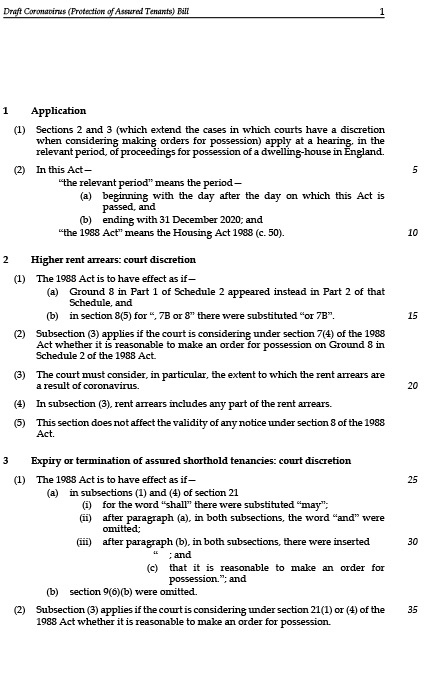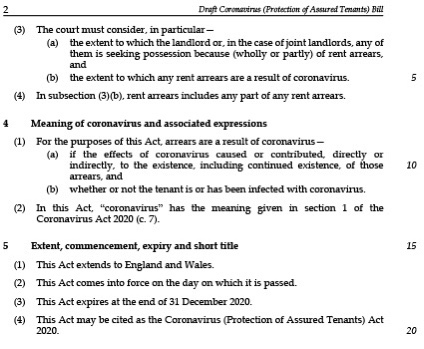|
|
|

|
|
Updates from the last 24 hours on the blog, sent on 25 May 2020.
|
|
|
|
|
|
|
|
The key recommendations are:
|
i) on rough sleeping and homelessness, a serious opportunity to bring it to an end in large part. Needs:
|
- Task force to costs and Govt to fund ‘housing-led solution'.
- Fund councils to help with No Recourse to Public Funds rough sleepers, and guidance on discretion.
- Boost supported housing provision
A pre-action protocol is not enough (including me telling them this):
|
|
21. We received evidence which argued the pre-action protocol would not be sufficient to prevent evictions under section 21 or for a ground 8 rent arrears claim. Giles Peaker, a housing solicitor, told us in those circumstances that “failure to comply with a PAP simply cannot prevent a possession order being made, or indeed result in a delay to a possession order being made to any significant degree”. In a similar vein, Citizens Advice told us:
|
|
In theory, Courts should take into account whether this protocol has been followed when considering what orders to make in social housing. However, this only applies to discretionary grounds in practice. Private landlords rarely use only discretionary grounds–they may use either ground 8, section 8 of the Housing Act 1988 (a mandatory ground), or section 21, or both.
|
|
22. We are wary of the Government reliance on conversations between landlords and tenants which have little legal force. Housing security for renters should not rest with individuals. The Government is already aware that tenants require greater security in the rental sector: it said as much in the Queen’s Speech background briefing notes on the planned Renters’ Reform Bill. Legislating to protect tenants from the minority of landlords lacking compassion does not invalidate the premise that most landlords behave in good faith; it protects those at the sharp edge of the crisis from facing homelessness.
|
|
23. At the moment, judges cannot exercise any such discretion for section 21 applications or mandatory ground 8 section 8 applications, as discussed.
|
Mandatory rent arrears (and section 21) grounds for possession need to be removed for the interim. (I'll come back to the draft Bill below).
|
Unless the Government amends existing housing legislation, its plans to introduce a pre-action protocol to the private rented sector will be toothless and will fail to prevent a cliff edge of evictions once the moratorium on possession cases ends. We recommend the Government bring forward legislation to amend the 1985 and 1988 Housing Acts to allow judges to usediscretion where a tenant is in rent arrears due to the coronavirus crisis for the next 12 months at a minimum. Discretion could include consideration of whether a pre-action protocol has been complied with. These amendments should be delivered through a short Bill—such as we have proposed—which must be introduced to Parliament as soon as possible.
|
Permanent abolition of section 21 needs to accelerated:
|
The Government must accelerate its plans to introduce the Renters’ Reform Bill to Parliament and abolish ‘no fault evictions’ under section 21 of the Housing Act 1988 within the next 12 months. By amending the Act to allow judges to exercise discretion, the Government will have time to deliver a Bill which provides greater security for tenants.
|
And LHA/UC housing element needs to be set at a realistic level. Keep the 30th percentile level permanently, with reviews to see if situation merits increasing higher.
|
The Government must ensure that the Local Housing Allowance (LHA) rate is set at a level that reflects real market rents and ensures those in need are able to afford properties in their areas. We call on the Government to guarantee that the LHA rate will be maintained at the 30th percentile long-term. We also ask the Government to conduct work on what the impact on renters and the wider rental market would be of raising LHA rates further.
|
The draft Bill referred to is this (oddly only available as an image file).
|
|

|
|
|

|
Some comments on this - a time limited set of amendments to 31 December 2020.
|
This only affects Housing Act 1988 tenancies - assured and assured shorthold - not Housing Act 1985 or any other kind of tenancy (Rent Act, Agricultural, etc.). But it effectively makes both ground 8 and section 21 claims discretionary grounds for possession, removing the mandatory effect.
|
I'm not sure why ground 8 is just moved from part 1 of Schedule 2 HA 1988 to part 2, rather than being made of no effect for the relevant period. Grounds 10 and 11 cover ‘discretionary' rent arrears claims, and an additional ‘ground 8 but hey, this one is discretionary' adds nothing to that.
|
But why restrict the 2(3) ‘court must consider if arrears are a result of coronavirus' to ground 8 alone? Why not also grounds 10 and 11? Further, why not add this to Housing Act 1985 rent arrears discretionary grounds? Or Rent Act discretionary grounds?
|
On the s.21 temporary amends, this works to introduce a discretion for the court as to whether to make a possession order, and also to suspend it. But how would the ‘court must consider the extent to which LL is seeking possession due to (coronavirus) arrears' work?Who is to evidence this? And how would tenants evidence it in a case? Tenant says ‘it is rent arrears’, Landlord says ‘I want to sell’. What then? How is that adjudicated?
|
Why not just remove s.21 from having effect for the relevant period?
|
And also, what of other forms of tenancy where any extension for the time for possession is restricted by section 89 Housing Act 1980 to a maximum of six weeks?
|
But beyond the immediate details of housing law, what this draft Bill does not do is make any address to what happens about rent arrears in the meantime, because possession claims are not the only issue.
|
Money claims (and threats of bankruptcy, although I'll grant these will be much rarer) are not in any way restrained by this draft Bill. Tenants could certainly face County Court judgments for money claims, ruining their credit records, their future ratings and leaving them open to attachment of earnings or third party debt orders. This needs some kind of measure, as we previously noted here.
|
It is worth noting that this is a cross party (Tory majority) committee of MPs, and this interim report has no dissent. It seems that everyone (except so far the Government) agrees that some form of measure is needed to address the possession claim cliff edge. There are now various proposals - which aren't necessarily mutually incompatible, but do have a greater or lesser extent - but from the government, as yet, silence.
|
|
|
|
|
|
|
|
|
|
|
Follow Nearlylegal on Twitter -
|
|
|
|
|
|
|